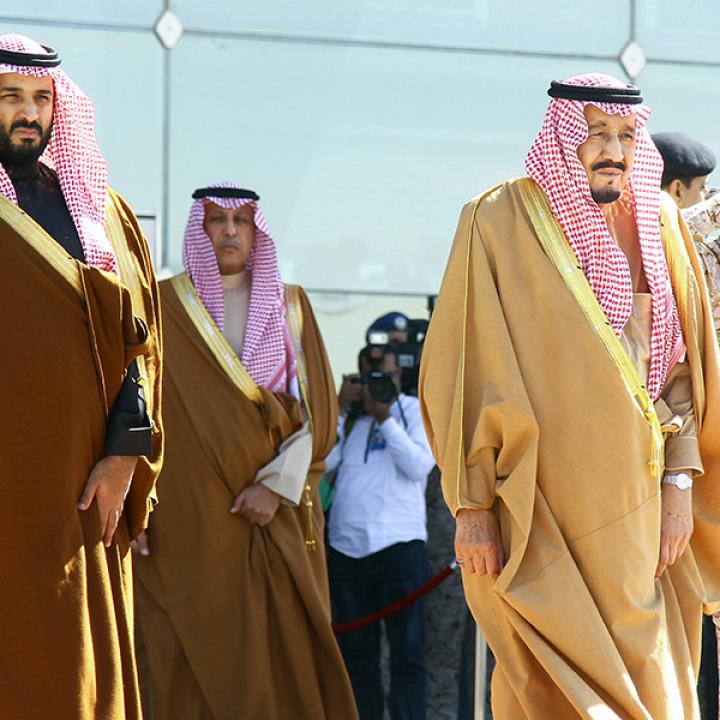

The prospect of MbS ruling for decades was once thought to portend stability for the kingdom, but that judgment now seems premature.
The traditional way of looking at Saudi Arabia has been that the royal family rules by consensus and with caution, choosing leaders based on experience and seniority. That template has been increasingly invalidated since the accession of King Salman in January 2015 and the emergence of his thirty-three-year-old son Muhammad bin Salman, who has been crown prince and heir apparent since June 2017.
Under MbS, now the kingdom’s de facto day-to-day leader, Saudi Arabia has begun transforming its economy (in the form of his “Vision 2030” plan), its society (e.g., opening cinemas and giving women the right to drive), and its religion (a supposed reversion to a more “moderate Islam”). Yet he has not opened the political sphere to ordinary Saudis; he also appears to have sharply reduced the role of the wider al-Saud family, sidelining thousands of princes.
The kingdom’s once-broad power structure now appears to rest on the shoulders of two men. King Salman, age eighty-two and in declining health, is increasingly a mere figurehead, albeit a diplomatically convenient one for Riyadh during the Jamal Khashoggi crisis. The fiction of his rule was preserved most recently by a telephone call from President Trump and a short visit with Secretary of State Mike Pompeo. The royal orders sacking a key media advisor to MbS and four intelligence officials were issued in the king’s name, though it is unclear how involved he was in the decision.
Meanwhile, MbS has become the most powerful crown prince in Saudi history. Since replacing his father as defense minister nearly four years ago, he has steadily concentrated all of the kingdom’s disparate military forces under his control. When he orchestrated the resignation of former crown prince Muhammad bin Nayef last year, he transferred leadership of the Interior Ministry to MbN’s young nephew while emaciating the institution’s past dominance in security affairs. Likewise, when the crown prince’s last obvious rival, Mitab bin Abdullah, was accused of corruption and locked up in the Riyadh Ritz-Carlton last November, he was stripped of his post atop the powerful Saudi Arabian National Guard and replaced by a peripheral family member.
The few princes who have managed to retain their prominence are either too old or too young to rival MbS, who has methodically sidelined a swath of royals in their fifties and sixties who likely once regarded themselves as future contenders for the throne. They include:
Surviving brothers of King Salman. Whether directly or via their eldest sons, these princes notionally dominate the Allegiance Council, the body tasked with confirming the selection of crown princes. Former interior minister Prince Ahmed, the king’s last surviving full brother, reappeared in the news recently when he was involved in an altercation with demonstrators in London, but he plays no obvious role in palace politics. The king’s youngest half-brother, Prince Muqrin, has a formidable resume—including time as an F-15 pilot, provincial governor, intelligence chief, and, briefly, crown prince—but was pushed aside because King Salman saw him as too much a protege of the late King Abdullah. The fact that his mother was a concubine rather than a wife of the kingdom’s founder, Ibn Saud, likely stunted his succession potential as well.
Sons of the late King Faisal. Mecca provincial governor Prince Khalid al-Faisal was dispatched to Turkey this month as the king’s envoy to President Recep Tayyip Erdogan. Yet at seventy-seven years old, he is seen as merely an advisor, not a realistic candidate for the throne. His half-brother Prince Turki—formerly an intelligence chief and ambassador to Washington and London—has been an unofficial mouthpiece for Riyadh in recent years. He has yet to speak publicly on the current crisis, however, despite (or perhaps because of) the fact that he employed Khashoggi as a media advisor during his postings abroad. The preeminent member of this sub-clan was veteran foreign minister Saud al-Faisal, who died in 2015. Their father was respected as king, but he won the throne by deposing his predecessor and was himself assassinated by a nephew—two abrupt transitions that traumatized the royal family.
Junior princes. These include sons of King Salman or previous kings and crown princes. The only one of any prominence is Khalid bin Salman, the younger brother of MbS and former F-15 pilot who was appointed ambassador to the United States last year at the age of twenty-nine. He is currently back in Riyadh for consultations. Some of his cousins have been given second-tier roles in ministries and provincial governments, including Khalid bin Bandar, who is son to former U.S. envoy Bandar bin Sultan and currently serves as ambassador to Germany, where he recently returned after a months-long diplomatic rift. Such moves have been interpreted as efforts to bolster the crown prince’s perceived youthful new approach to governance, not as precursors to power for the appointees.
CONCLUSION
The Khashoggi affair has sparked speculation that the royal family may want to sideline or remove MbS because of his authoritarian style and perceived excesses. As yet, however, there is no visible evidence of this. For all intents and purposes, he remains the kingdom’s future—which also means that if he were to drop out of contention for the throne anytime soon, it would create a clear void. The prospect of MbS ruling for decades was once thought to portend stability for the kingdom, but that judgment now seems premature.
Simon Henderson is the Baker Fellow and director of the Bernstein Program on Gulf and Energy Policy at The Washington Institute, where he authored two landmark studies on Saudi succession, After King Abdullah and After King Fahd.



